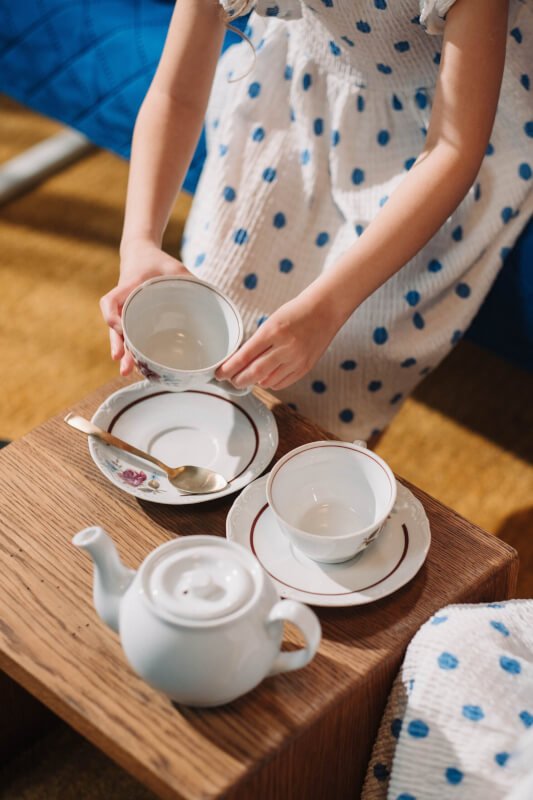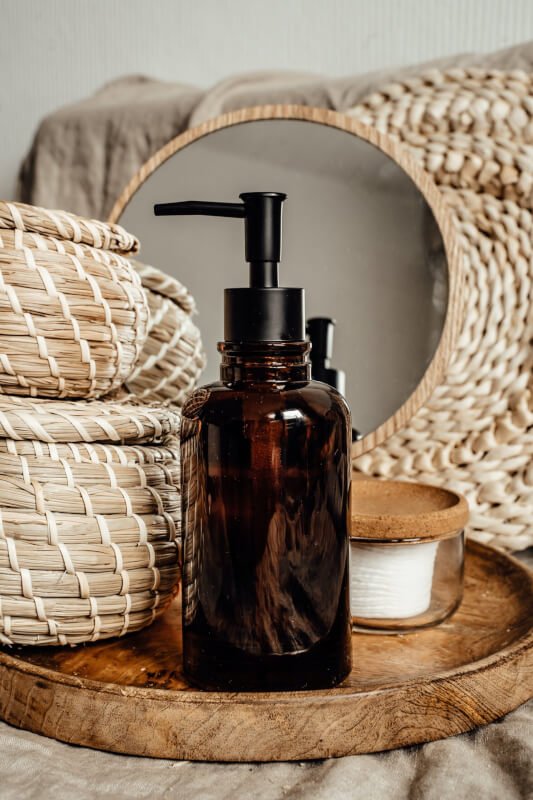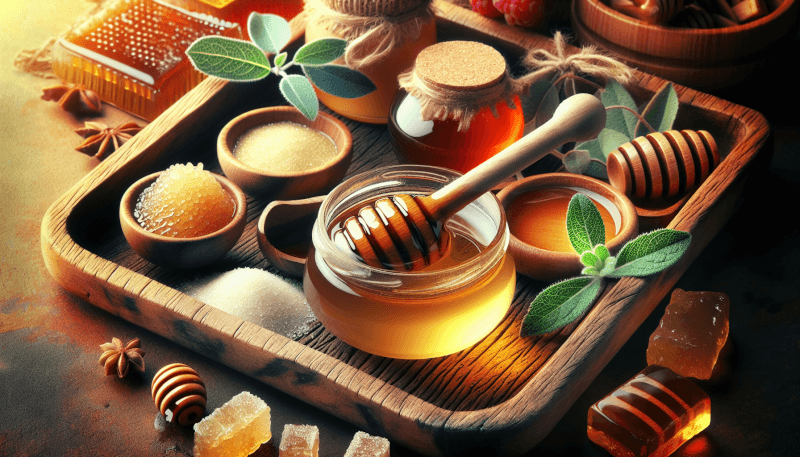So you’ve always enjoyed a nice cup of tea but want to cut back on your sugar intake? Look no further. In this article, we’ll explore the world of brewing tea with alternative sweeteners. Whether you’re craving the rich taste of honey or the subtle sweetness of stevia, we’ve got you covered. Get ready to elevate your tea-drinking experience with these delicious and healthier options.
Benefits of Brewing Tea with Alternative Sweeteners
Reduced calorie intake
When you choose to brew tea with alternative sweeteners, you can significantly reduce your calorie intake compared to using traditional sweeteners like white sugar or artificial sweeteners. Alternative sweeteners such as stevia, honey, coconut sugar, maple syrup, and agave nectar provide natural sweetness without adding excessive calories to your brew. This is especially beneficial if you are trying to manage your weight or reduce your sugar consumption.
Lowered blood sugar levels
For those who need to monitor their blood sugar levels, brewing tea with alternative sweeteners can be a healthier choice. Traditional sweeteners like white sugar can cause blood sugar spikes and have a negative impact on overall health. Alternative sweeteners like stevia, for example, have minimal effect on blood glucose levels, making them suitable options for individuals with diabetes or those looking to maintain stable blood sugar levels.
Increased antioxidant content
Tea is already known for its high antioxidant content, but when you add alternative sweeteners to your brew, you can boost the overall antioxidant levels even more. Stevia, honey, coconut sugar, maple syrup, and agave nectar all contain beneficial compounds that contribute to your body’s antioxidant defense system. By choosing alternative sweeteners, you not only enjoy a naturally sweetened cup of tea but also gain additional health benefits.
Enhanced flavor profile
Using alternative sweeteners can bring a whole new dimension of flavor to your tea. Each alternative sweetener has its own distinct taste, which can complement and enhance the flavors of different types of tea. Stevia, for example, offers a clean and slightly herbal sweetness, while honey adds floral undertones. Coconut sugar imparts a rich caramelized flavor, maple syrup creates a subtle sweetness with a hint of maple, and agave nectar provides a mild and floral sweetness. By experimenting with different alternative sweeteners, you can create unique flavor profiles that suit your preferences.
Types of Alternative Sweeteners to Use
Stevia
Stevia is a natural sweetener derived from the leaves of the stevia plant. It is known for its intense sweetness, as it is up to 200 times sweeter than regular sugar. Stevia is popular for its zero-calorie content and its minimal impact on blood sugar levels, making it an excellent alternative sweetener for tea.
Honey
Honey is a versatile and widely used sweetener around the world. It is produced by bees from the nectar of flowers, giving it a distinct flavor profile that varies depending on the floral source. Honey contains antioxidants and has antimicrobial properties. It can add a delightful natural sweetness to your tea and is particularly well-suited for herbal and floral teas.
Coconut sugar
Coconut sugar, also known as coconut palm sugar, is made from the sap of coconut palm flower buds. It has a rich caramel-like flavor and a similar sweetness to regular sugar. Coconut sugar is a popular alternative sweetener for baking, but it can also be used to sweeten your tea. It adds a unique depth of flavor and pairs well with black teas and chai blends.
Maple syrup
Maple syrup is derived from the sap of maple trees, often associated with pancakes and waffles. It offers a distinct, sweet flavor with a hint of maple. Maple syrup is a natural sweetener that contains antioxidants and minerals like zinc and manganese. It can be used to sweeten a variety of teas, including black teas, oolong teas, and even chai.
Agave nectar
Agave nectar is produced from the sap of the agave plant, which is native to Mexico. It has a mild, honey-like sweetness and a low glycemic index, meaning it has a minimal impact on blood sugar levels. Agave nectar is an excellent choice for those looking for a vegan alternative sweetener and can be used in a wide range of teas, from green teas to herbal infusions.

Factors to Consider When Brewing Tea with Alternative Sweeteners
Sweetness level
One crucial factor to consider when using alternative sweeteners in your tea is the desired level of sweetness. Different sweeteners have different levels of sweetness, and personal preference plays a significant role in determining the ideal balance. Start with a small amount and adjust to taste, gradually adding more sweetener if needed. It’s important to find the right amount that enhances the flavor without overpowering it.
Flavor compatibility
Another factor to consider is the flavor compatibility between the tea and the alternative sweetener. Some sweeteners may complement certain types of tea better than others. For example, the floral notes of honey are a perfect match for chamomile tea, while the rich caramel flavor of coconut sugar can enhance the boldness of black teas. Experiment with different combinations to find the pairings that best suit your taste buds.
Brewing temperature
The brewing temperature of your tea can also impact the sweetness and overall flavor profile. Some alternative sweeteners, such as honey and maple syrup, may lose some of their distinct flavors if exposed to high temperatures for an extended period. It is generally recommended to add these sweeteners to your tea once it has cooled slightly to preserve their unique qualities.
Quantity required
The quantity of alternative sweetener needed varies depending on personal taste preferences and the sweetness level of the chosen sweetener. Some sweeteners, like stevia, are highly concentrated, so only a small amount is required to achieve the desired sweetness. Others, like coconut sugar or maple syrup, may require more significant quantities to achieve the desired flavor. It’s essential to start by adding a small amount and gradually adjust until you find your desired taste.
Methods for Brewing Tea with Alternative Sweeteners
Hot brewing method
The hot brewing method is the most common way of preparing tea and using alternative sweeteners. To brew tea using alternative sweeteners with this method, simply boil water and steep your favorite tea leaves or tea bags for the recommended time. Once you have prepared your tea, add your preferred alternative sweetener, adjusting the amount to your desired sweetness level. Stir well until the sweetener dissolves, and enjoy your hot and delicious brew.
Cold brewing method
Cold brewing tea is a popular method, especially during hot summer months when a refreshing iced tea is desired. To cold brew tea with alternative sweeteners, start by combining your chosen tea leaves or tea bags with cold water in a pitcher or container. Let the tea steep in the refrigerator for several hours or overnight to extract the flavors gradually. Once the infusion is complete, add your alternative sweetener and stir well. The resulting cold brew will be naturally sweetened and perfect for drinking over ice.
Infusion method
The infusion method involves adding the alternative sweetener directly to the hot water or tea leaves during the brewing process. This method allows the sweetener to infuse into the tea, providing a more integrated and harmonious sweetness. To use the infusion method, simply add your alternative sweetener to the water or tea leaves before brewing and proceed with the brewing process as usual. This method works well with alternative sweeteners that dissolve easily, such as stevia or maple syrup.

Recipes for Brewing Tea with Alternative Sweeteners
Stevia-infused green tea
Ingredients:
- 1 teaspoon green tea leaves
- 1 cup hot water
- 1-2 drops liquid stevia (adjust to taste)
Instructions:
- Place the green tea leaves in a tea infuser or teapot.
- Pour hot water over the leaves and let steep for 2-3 minutes.
- Remove the tea leaves and add a few drops of liquid stevia, adjusting the sweetness to your preference.
- Stir well and enjoy your stevia-infused green tea.
Honey-sweetened chamomile tea
Ingredients:
- 1 chamomile tea bag
- 1 cup hot water
- 1 teaspoon honey (adjust to taste)
Instructions:
- Place the chamomile tea bag in a cup.
- Pour hot water over the tea bag and let steep for 5 minutes.
- Remove the tea bag and add honey, adjusting the sweetness to your liking.
- Stir well until the honey is fully dissolved, and savor the soothing flavors of honey-sweetened chamomile tea.
Coconut sugar black tea latte
Ingredients:
- 1 black tea bag
- 1 cup hot water
- 1/4 cup milk (dairy or plant-based)
- 1 tablespoon coconut sugar (adjust to taste)
- A dash of cinnamon (optional)
Instructions:
- Steep the black tea bag in hot water for 3-5 minutes.
- While the tea is brewing, heat the milk in a separate pot or microwave until warm.
- Remove the tea bag and stir in the coconut sugar until dissolved.
- Pour the warm milk into the tea, adding a dash of cinnamon if desired.
- Mix well and enjoy your cozy coconut sugar black tea latte.
Maple syrup oolong tea
Ingredients:
- 1 tablespoon oolong tea leaves
- 1 cup hot water
- 1-2 teaspoons maple syrup (adjust to taste)
Instructions:
- Place the oolong tea leaves in a tea infuser or teapot.
- Pour hot water over the leaves and let steep for 3-4 minutes.
- Remove the tea leaves and stir in maple syrup, adjusting the sweetness to your preference.
- Stir well until the maple syrup is fully incorporated, and savor the unique flavors of maple syrup oolong tea.
Agave nectar herbal tea
Ingredients:
- 1 herbal tea bag (choose your favorite herbal blend)
- 1 cup hot water
- 1 teaspoon agave nectar (adjust to taste)
Instructions:
- Steep the herbal tea bag in hot water for the recommended time.
- Remove the tea bag and stir in agave nectar, adjusting the sweetness according to your liking.
- Mix well until the agave nectar is fully dissolved, and enjoy the naturally sweetened herbal tea.
Tips for Enhancing the Flavor of Tea with Alternative Sweeteners
Experiment with different ratios
To find the perfect balance of sweetness, don’t be afraid to experiment with different ratios of tea to alternative sweetener. Start with a small amount and gradually increase or decrease until you find the ideal ratio that suits your taste buds. Some teas may require more sweetness, while others may require less, so it’s all about finding the right balance.
Blend multiple sweeteners
For those who enjoy complexity in flavor, consider blending multiple alternative sweeteners together. Combining different sweeteners can create unique taste profiles that add depth and dimension to your tea. For example, blending honey and stevia can provide a balance between floral sweetness and herbal sweetness. Don’t be afraid to get creative and explore different combinations.
Add complementary herbs or spices
To further enhance the flavor of your tea, consider adding complementary herbs or spices along with your alternative sweetener. Mint leaves, ginger, cinnamon, or lemon zest can all add an extra layer of complexity and aromatics to your brew. Experiment with different combinations to create a personalized and delicious cup of tea.

Combining Alternative Sweeteners with Traditional Sweeteners
Balance of flavors
Combining alternative sweeteners with traditional sweeteners can provide a balance of flavors in your tea. For example, if you prefer the taste of traditional white sugar but want to reduce your overall sugar intake, you can add a smaller amount of white sugar along with your chosen alternative sweetener. This allows you to savor the familiar taste of traditional sweeteners while enjoying the unique flavors of alternative options.
Health considerations
Using a combination of alternative sweeteners and traditional sweeteners can be a health-conscious choice. By reducing the amount of traditional sweeteners and incorporating alternative options, you can lower your overall sugar consumption while still satisfying your taste buds. This is especially beneficial if you are looking to manage your weight, monitor your blood sugar levels, or reduce your risk of certain health conditions associated with excessive sugar intake.
Reduced sugar content
Combining alternative sweeteners with traditional sweeteners can help reduce the overall sugar content in your tea without sacrificing taste. Traditional sweeteners like white sugar are often used in larger quantities to achieve the desired level of sweetness, which can significantly contribute to calorie and sugar intake. By using alternative sweeteners in combination with traditional options, you can achieve the desired sweetness with less sugar.
Health Considerations for Using Alternative Sweeteners in Tea
Individual sensitivities or allergies
While alternative sweeteners are generally considered safe for consumption, it is important to consider individual sensitivities or allergies. Some people may have allergic reactions or intolerances to certain sweeteners. If you have any concerns or known sensitivities, it is best to consult with a healthcare professional or allergist before using alternative sweeteners in your tea.
Caloric content
Although alternative sweeteners offer a reduced calorie option compared to traditional sweeteners, it is still important to be mindful of the overall caloric content. While some alternative sweeteners like stevia and certain brands of erythritol are virtually calorie-free, others like honey, maple syrup, and coconut sugar do contain calories. If you are watching your calorie intake, be mindful of the quantity of sweetener used in your tea.
Glycemic index impact
For individuals who need to manage their blood sugar levels, it is important to consider the glycemic index (GI) impact of alternative sweeteners. The GI measures how quickly a food raises blood sugar levels compared to pure glucose. Alternative sweeteners like stevia and erythritol have minimal impact on blood sugar levels and are considered low glycemic. On the other hand, sweeteners like coconut sugar, honey, and maple syrup have higher glycemic index values. It is recommended to choose alternative sweeteners with lower glycemic index values for better blood sugar control.

Conclusion
Brewing tea with alternative sweeteners offers a range of benefits, including reduced calorie intake, improved blood sugar control, increased antioxidant content, and enhanced flavor profiles. With options like stevia, honey, coconut sugar, maple syrup, and agave nectar, each alternative sweetener brings its own unique taste and health benefits to your brew. When brewing tea with alternative sweeteners, factors to consider include sweetness level, flavor compatibility, brewing temperature, and the quantity required. Methods such as hot brewing, cold brewing, and infusion can be used to achieve the desired results. By trying recipes like stevia-infused green tea, honey-sweetened chamomile tea, coconut sugar black tea latte, maple syrup oolong tea, and agave nectar herbal tea, you can enjoy a variety of naturally sweetened tea options. Additional tips for enhancing the flavor include experimenting with different ratios, blending sweeteners, and adding complementary herbs or spices. Combining alternative sweeteners with traditional sweeteners can provide a balance of flavors, health considerations, and reduced sugar content. It is important to be mindful of individual sensitivities or allergies, caloric content, and glycemic index impact when using alternative sweeteners in tea. ultimately, brewing tea with alternative sweeteners offers a delicious and healthier way to enjoy your favorite cup of tea.


